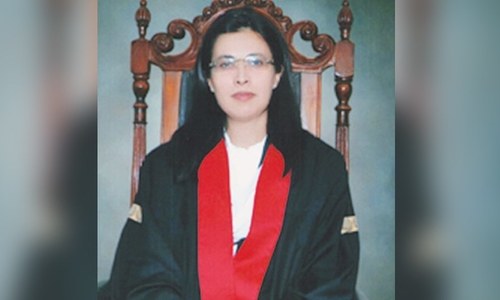Lawyers to protest against LHC judge’s elevation to SC on 9th

ISLAMABAD: A number of bodies representing lawyers across the country have called upon their members to turn up in large numbers at a convention in front of the Supreme Court on Thursday (Sept 9) to register their protest against the elevation of Justice Ayesha A. Malik of the Lahore High Court to the apex court.
The convention coincides with a meeting of the Judicial Commission of Pakistan (JCP) which is to consider the elevation of Justice Ayesha Malik to the apex court.
The lawyers are up in arms over the nomination as they feel it violates the seniority principle since Justice Ayesha Malik is only the fourth most senior judge at the LHC.
The appeal was made after a joint meeting of the Pakistan Bar Council (PBC), the Supreme Court Bar Association (SCBA), the Islamabad Bar Council and the high court bar associations at the PBC office on Monday.
Arrangements for the All Pakistan Lawyers Convention were finalised at the meeting.
The meeting condemned the passage of a bill by the National Assembly regarding amendments to the Legal Practitioners and Bar Councils Act, 1973, by inserting a provision — Section 5D — in the act that was against the “basic structure of the Constitution” as well as a “gross violation of parliamentary norms and democratic principles”.
The committee decided to challenge the amendment through “all lawful means available”.
Akhtar Hussain, a senior member of the PBC who represents the council in JCP meetings, criticised the commission for ignoring the seniority principle for elevation of high court judges to the Supreme Court.
Since the rules relating to the appointment of judges were silent on apportioning a quota to any province or a particular high court, it was not necessary that judges were selected for elevation to the Supreme Court from a particular high court, Mr Akhtar argued.
Instead, a judge could be chosen from any high court, he emphasised. Akhtar Hussain suggested that Justice Athar Minallah, the Islamabad High Court’s Chief Justice, be elevated to the apex court since he was the country’s most senior high court judge.
Referring to the elevation of a woman judge to the Supreme Court, Akhtar Hussain wondered why was Justice Mussarat Hilali, fourth in the Peshawar High Court’s seniority list, not considered.
Published in Dawn, September 7th, 2021












































